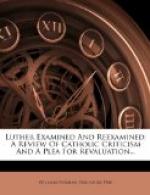Luther is said to have been a glutton and a drunkard. “Let us examine the facts. What is the evidence? Luther’s obesity and his gout. Is that evidence? Not in any court. It would be evidence if both conditions were caused, and caused only, by gluttony and tippling. But this notoriously is not the case. Obesity may be due to disease. A man may even eat little and wax stout if what he eats turns into adipose rather than into muscular tissue. As for gout, it is the result of uric acid diathesis. Now uric acid diathesis may be, and very often is, caused by high living, but often, too, it is due to quite different causes. Just as in the case of Bright’s disease. I do not deny that Luther drank freely both beer and wine. So did everybody else. People drank beer as we do coffee. . . . Moreover, in the sixteenth century alcoholic beverages were prescribed for the maladies from which Luther suffered much—kidneys and nervous trouble. We now know that in such cases alcohol proves a very poison; but this Luther could not know. But intemperate . . . in his use of strong drink Luther was not. Neither was he a glutton. Before he married, he ate very irregularly, and often completely forgot his meals. When he could not get meat and wine, he contented himself with bread and water. . . . Melanchthon tells us that Luther loved the coarse food as he did the coarse speech of the peasantry, and even of that food ate little, so little that Melanchthon marveled how Luther could maintain strength upon such a diet.—It is further a noteworthy fact that, when we read the sermons of the day, we find nobody who so frequently and so earnestly attacks the prevailing vice of drunkenness as does Luther. Now, whatever Luther may or may not have been, hypocrite he was not. Had he himself been intemperate, he would not have preached against it in such a manner. Furthermore, Luther was under constant espionage. His every move was noted. People knew how many patches there were on his undergarments. Think you, think you for a moment, that the Wittenbergians would have listened meekly to Luther’s repeated assaults upon the wide-spread sin of intemperance, had they known him for a confirmed tippler? It is too absurd.—But the best evidence for the defense comes from a mute witness—Luther’s industry. He wrote more than four hundred books, brochures, sermons, and so forth, filling more than one hundred volumes of the Erlangen edition. There are extant more than three thousand of his letters, which represent only a small proportion of all that he wrote. Thus we know, for example, that one evening in 1544 Luther wrote ten letters, of which only two have been preserved. He was, furthermore, in frequent conference with leaders in both Church and State. He preached on Sundays and lectured on week-days. Now, a man may, it is true, perform a considerable amount of manual labor even after overeating and overdrinking, but every physician will admit the correctness of my assertion, it is a physiological impossibility that a man could habitually overindulge in food or liquor, or both, and still get over the enormous amount of intellectual work that Luther performed day to day” (Boehmer, The Man Luther, p. 16 f.)




